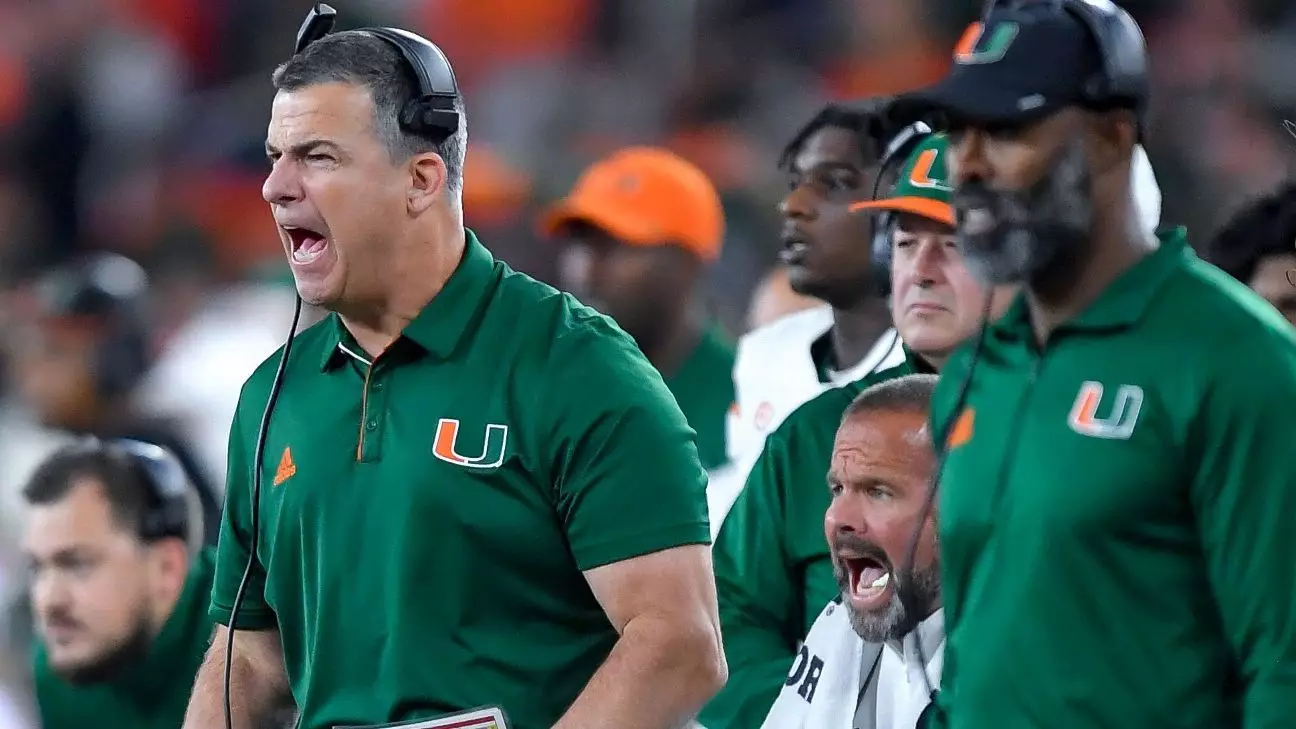The recent release of the College Football Playoff (CFP) rankings has sent shockwaves through the college football community, particularly for the Miami Hurricanes. The rankings placed Miami at No. 12, handing the spotlight to Alabama, which squeezed into the No. 11 position. With the final selection day approaching, the implications of such rankings are monumental, as they dictate which teams are given the chance to compete for the national championship. This turn of events has not only sparked disappointment amongst Miami’s fans and players but has also ignited criticism from the Atlantic Coast Conference (ACC) leadership.
ACC commissioner Jim Phillips articulated the league’s displeasure with the selection committee’s decision, stating his “shock” and disappointment over Miami’s plummet in the rankings. The commitment to fairness remains central, and Phillips argued that Miami’s body of work merits a more favorable ranking, given their performance throughout the season. Coach Mario Cristobal echoed those sentiments during his interview, emphasizing that his team’s record and competitiveness in games should weigh heavily in the committee’s evaluation.
Cristobal made a compelling case, highlighting that the Hurricanes achieved a commendable 10-win season. He pointed out that Miami’s only two losses were narrow defeats, which adds context to their overall performance. The coach implored the committee to consider the data objectively, stating, “We won 10 games this year, and not many teams have.” His stance positions Miami as deserving of a CFP spot, challenging the notion that rankings should be solely determined by the outcome against selected opponents.
Despite a promising start to the season, where Miami opened 9-0, recent performances have been troubling. A disappointing loss to Syracuse marked their second defeat in three games, which ultimately cost them a shot at the ACC championship. Their struggles in the latter part of the season prompted skepticism about their candidacy for a CFP berth, especially given that they could not secure a spot in the title game.
Nonetheless, it is important to highlight the statistical achievements Miami accrued before faltering. They led the nation in both yardage and points per game, boasting a lineup that includes standout quarterback Cam Ward, who emerged as a top contender for the Heisman Trophy with his staggering 36 touchdown passes. Such achievements showcase Miami’s offensive prowess and validate Cristobal’s argument that they should not be overlooked.
Critics of Miami’s candidacy bring forth a variety of arguments against their ranking and playoff hopes. Foremost among these is the contention that the Hurricanes failed to secure victories against ranked opponents throughout their schedule. Additionally, defensive weaknesses were exposed, notably allowing 31 points or more in five games over the closing stretch of the regular season.
This inconsistency raises red flags for the selection committee, compelling them to reassess the Hurricane’s qualifications for playoff contention. Critics believe that while Miami has had statistical successes, the lack of robust defensive performance coupled with key defeats cannot be ignored.
The Hurricanes and their supporters will undoubtedly be watching closely as the final rankings are deliberated. Coach Cristobal’s insistence that the committee should “go to the facts” resonates, as data-driven assessments can serve as an equalizing factor against subjective judgments. Miami’s passionate fan base, bolstered by their historical significance in college football, will argue fervently in favor of the team.
The stakes are high for the Hurricanes as they await the final decision. While the road has certainly encountered its share of bumps, the narrative surrounding them encapsulates a blend of pride in their achievements and disappointment in their ranking. How the committee ultimately responds to Miami’s arguments could reshape perceptions of their season and future prospects in postseason play.
The conversation surrounding Miami Hurricanes’ CFP ranking is far from over. With a commitment to performance and a hope for reconsideration, the stage is set for an exciting culmination to the college football season. As the controversy unfolds, it reminds us that in sports, the narrative is often as critical as the numbers.

Leave a Reply